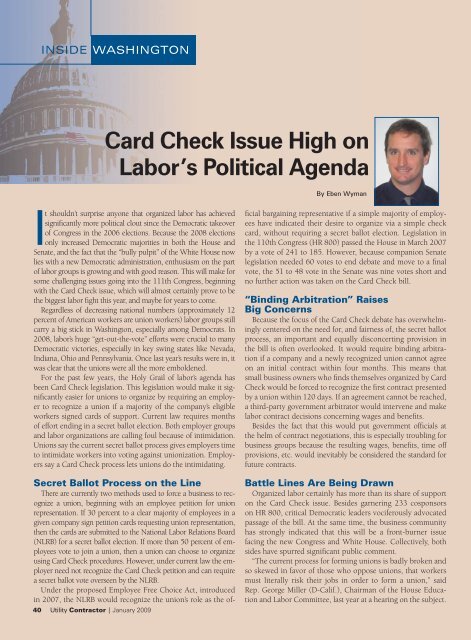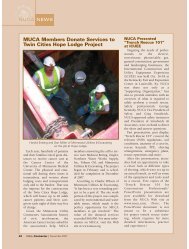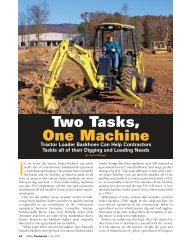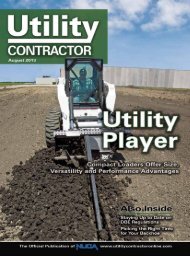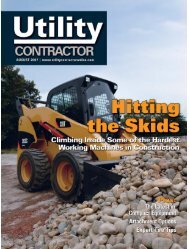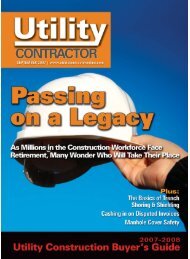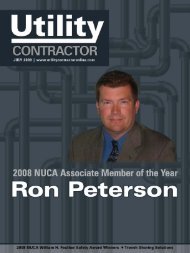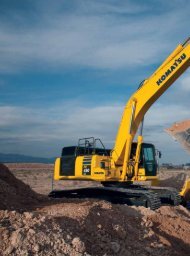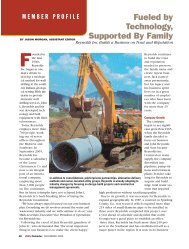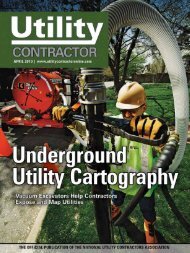View Full January PDF Issue - Utility Contractor Online
View Full January PDF Issue - Utility Contractor Online
View Full January PDF Issue - Utility Contractor Online
Create successful ePaper yourself
Turn your PDF publications into a flip-book with our unique Google optimized e-Paper software.
INSIDE WASHINGTONCard Check <strong>Issue</strong> High onLabor’s Political AgendaBy Eben WymanIt shouldn’t surprise anyone that organized labor has achievedsignificantly more political clout since the Democratic takeoverof Congress in the 2006 elections. Because the 2008 electionsonly increased Democratic majorities in both the House andSenate, and the fact that the “bully pulpit” of the White House nowlies with a new Democratic administration, enthusiasm on the partof labor groups is growing and with good reason. This will make forsome challenging issues going into the 111th Congress, beginningwith the Card Check issue, which will almost certainly prove to bethe biggest labor fight this year, and maybe for years to come.Regardless of decreasing national numbers (approximately 12percent of American workers are union workers) labor groups stillcarry a big stick in Washington, especially among Democrats. In2008, labor’s huge “get-out-the-vote” efforts were crucial to manyDemocratic victories, especially in key swing states like Nevada,Indiana, Ohio and Pennsylvania. Once last year’s results were in, itwas clear that the unions were all the more emboldened.For the past few years, the Holy Grail of labor’s agenda hasbeen Card Check legislation. This legislation would make it significantlyeasier for unions to organize by requiring an employerto recognize a union if a majority of the company’s eligibleworkers signed cards of support. Current law requires monthsof effort ending in a secret ballot election. Both employer groupsand labor organizations are calling foul because of intimidation.Unions say the current secret ballot process gives employers timeto intimidate workers into voting against unionization. Employerssay a Card Check process lets unions do the intimidating.40 <strong>Utility</strong> <strong>Contractor</strong> | <strong>January</strong> 2009Secret Ballot Process on the LineThere are currently two methods used to force a business to recognizea union, beginning with an employee petition for unionrepresentation. If 30 percent to a clear majority of employees in agiven company sign petition cards requesting union representation,then the cards are submitted to the National Labor Relations Board(NLRB) for a secret ballot election. If more than 50 percent of employeesvote to join a union, then a union can choose to organizeusing Card Check procedures. However, under current law the employerneed not recognize the Card Check petition and can requirea secret ballot vote overseen by the NLRB.Under the proposed Employee Free Choice Act, introducedin 2007, the NLRB would recognize the union’s role as the officialbargaining representative if a simple majority of employeeshave indicated their desire to organize via a simple checkcard, without requiring a secret ballot election. Legislation inthe 110th Congress (HR 800) passed the House in March 2007by a vote of 241 to 185. However, because companion Senatelegislation needed 60 votes to end debate and move to a finalvote, the 51 to 48 vote in the Senate was nine votes short andno further action was taken on the Card Check bill.“Binding Arbitration” RaisesBig ConcernsBecause the focus of the Card Check debate has overwhelminglycentered on the need for, and fairness of, the secret ballotprocess, an important and equally disconcerting provision inthe bill is often overlooked. It would require binding arbitrationif a company and a newly recognized union cannot agreeon an initial contract within four months. This means thatsmall business owners who finds themselves organized by CardCheck would be forced to recognize the first contract presentedby a union within 120 days. If an agreement cannot be reached,a third-party government arbitrator would intervene and makelabor contract decisions concerning wages and benefits.Besides the fact that this would put government officials atthe helm of contract negotiations, this is especially troubling forbusiness groups because the resulting wages, benefits, time offprovisions, etc. would inevitably be considered the standard forfuture contracts.Battle Lines Are Being DrawnOrganized labor certainly has more than its share of supporton the Card Check issue. Besides garnering 233 cosponsorson HR 800, critical Democratic leaders vociferously advocatedpassage of the bill. At the same time, the business communityhas strongly indicated that this will be a front-burner issuefacing the new Congress and White House. Collectively, bothsides have spurred significant public comment.“The current process for forming unions is badly broken andso skewed in favor of those who oppose unions, that workersmust literally risk their jobs in order to form a union,” saidRep. George Miller (D-Calif.), Chairman of the House Educationand Labor Committee, last year at a hearing on the subject.


